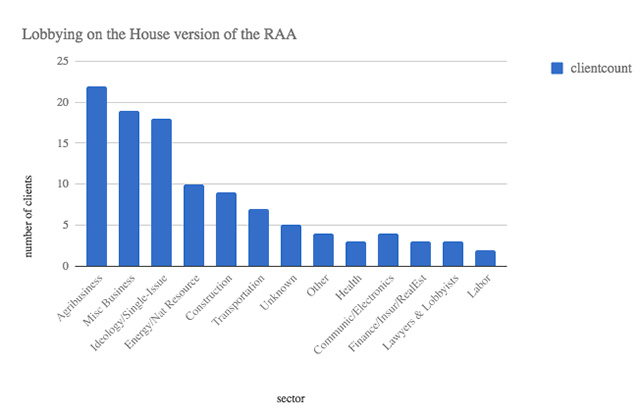
As part of President Trump’s promise to dismantle the regulatory state, his administration has cancelled or delayed Obama-era protections for workers and the environment. It has installed agency heads unlikely to pursue strict enforcement of existing rules. And it has allowed political appointees to oversee the rollback of rules affecting their previous employers.
Now industry groups see another opening: procedural reform in Congress that would complicate and likely hinder the rulemaking process. Two such bills have generated a flurry of lobbying activity this year.
The Regulatory Accountability Act (RAA) is the sixth-most lobbied bill in the current Congress, with at least 109 clients: 23 from agribusiness, 10 from the energy sector, 9 from construction, and 7 from transportation, among others. The extent of lobbying activity is likely greater, as lobbyists’ disclosure forms often avoid disclosing specific legislation.

Ronald Levin, a law professor at Washington University in St. Louis, described the bill as containing many provisions — some desirable, some innocuous, and some very troubling. “It’s the troubling ones that are really driving it,” he added, with political muscle coming from the Chamber of Commerce and various industries. “They want these measures that would complicate the rulemaking process.”
The RAA passed the House during the Obama administration but died in the Senate. In January, Senators Rob Portman (R-Ohio) and Heidi Heitkamp (D-ND) introduced a modified version of the House bill. Few doubt that President Trump would sign it if given the chance.
Under current law, independent regulatory agencies (think the Federal Reserve or the Consumer Financial Protection Bureau) and those under White House control follow different rulemaking requirements. The latter group must submit a cost-benefit analysis to a White House agency known as the Office of Information and Regulatory Affairs, or OIRA, before any major rule can take effect. That review process acts as a check on poorly planned regulation. But some liberals have called OIRA the place where “regulations go to die” for the slow pace at which it makes determinations. Independent agencies can issue rules without first getting White House approval.
The RAA would change that. Independent regulatory agencies would have to submit a cost-benefit analysis and seek approval from OIRA before issuing significant rules.
The independent agencies value their autonomy. When the RAA was percolating in Congress in 2012, heads of six independent agencies sent a letter to senators arguing that the power of executive review would give the president “unprecedented authority” to influence their rulemaking ability. Opponents of the RAA contend that Congress made these agencies independent precisely to avoid any interference or influence from the White House.
Last week, the Senate confirmed Neomi Rao to lead OIRA. As a law professor at George Mason University, she made the case that independent agency heads should be subject to removal by the president. She also founded a center on regulatory affairs at the university that benefitted from a $10 million donation by the Charles Koch Foundation last year. Americans for Prosperity, the Koch-backed advocacy group, has lobbied for the RAA.
The RAA would also mandate trial-like hearings for economically significant rules. Agency experts would have to sit for cross-examination in what would likely be drawn-out and adversarial proceedings. The outcome would be fewer rules in areas with uncertainty, as there often is with regulation. “The concern is that uncertainty would be pounced upon at these hearings and add time and expense and delay,” said Cary Coglianese, director of the University of Pennsylvania’s Program on Regulation.
Industry representatives have long argued that many federal rules lack proper evaluation and are too stringent. The Chamber of Commerce has said that more transparency and accountability are needed in the rulemaking process. But Lisa Gilbert of Public Citizen, a liberal group that has lobbied against the RAA, called it “paralysis by analysis.” She added that its introduction as a bipartisan bill and its support from some moderate Democrats, like Senators Heitkamp and Joe Manchin (D-W.Va.), might win it enough votes to pass.
Even more worrisome to consumer and environmental advocates is the REINS Act. Introduced by Senator Rand Paul (R-Ky.), it’s the fifteenth-most lobbied bill with at least 71 clients. REINS would subject every new regulation with an expected impact over $100 million to congressional approval. Experts predict that this would inject partisan politics into the bureaucratic process.
Coglianese suggested that REINS would impact administrators’ approach to regulation in more subtle ways as well. Already administrators weigh the possibility of judicial review when formulating rules so that they hold up in court. REINS would force administrators to not only evaluate fidelity to any given statute, but to also consider how rules will play in Congress.
That would put politics front and center in ways that could be “undesirable and even irresponsible,” he added.
Media that fights fascism
Truthout is funded almost entirely by readers — that’s why we can speak truth to power and cut against the mainstream narrative. But independent journalists at Truthout face mounting political repression under Trump.
We rely on your support to survive McCarthyist censorship. Please make a tax-deductible one-time or monthly donation.